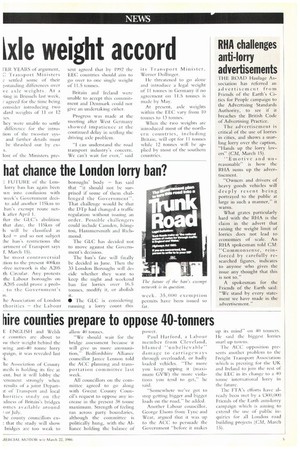ixle weight accord
Page 5

If you've noticed an error in this article please click here to report it so we can fix it.
['ER YEARS of argument, Transport Ministers
settled some of their ;-standing differences over ye axle weights. At a ling in Brussels last week, r agreed for the time being consider introducing two idard weights of 11 or 12 aes.
hey were unable to settle difference for the introtion of the two-tier sysand further details must be thrashed our by exs.
Lost of the Ministers pre scut agreed that by 1992 the EEC countries should aim to go over to one single weight of 11.5 tonnes.
Britain and Ireland were unable to accept this commitment and Denmark could not give an undertaking either.
Progress was made at the meeting after West Germany showed impatience at the continued delay in settling the driving axle problem.
"I can understand the road transport industry's concern. We can't wait for ever," said its Transport Minister, Werner 1)ollinger.
Ile threatened to go alone and introduce a legal weight of I I tonnes in Germany if no agreement on 11.5 tonnes is made by May.
At present, axle weights within the EEC vary from 10 tonnes to 13 tonnes.
When the two weights are introduced most of the northern countries, including Britain, will opt for 11 tonnes while 12 tonnes will be applied by most of the southern countries.






















































































